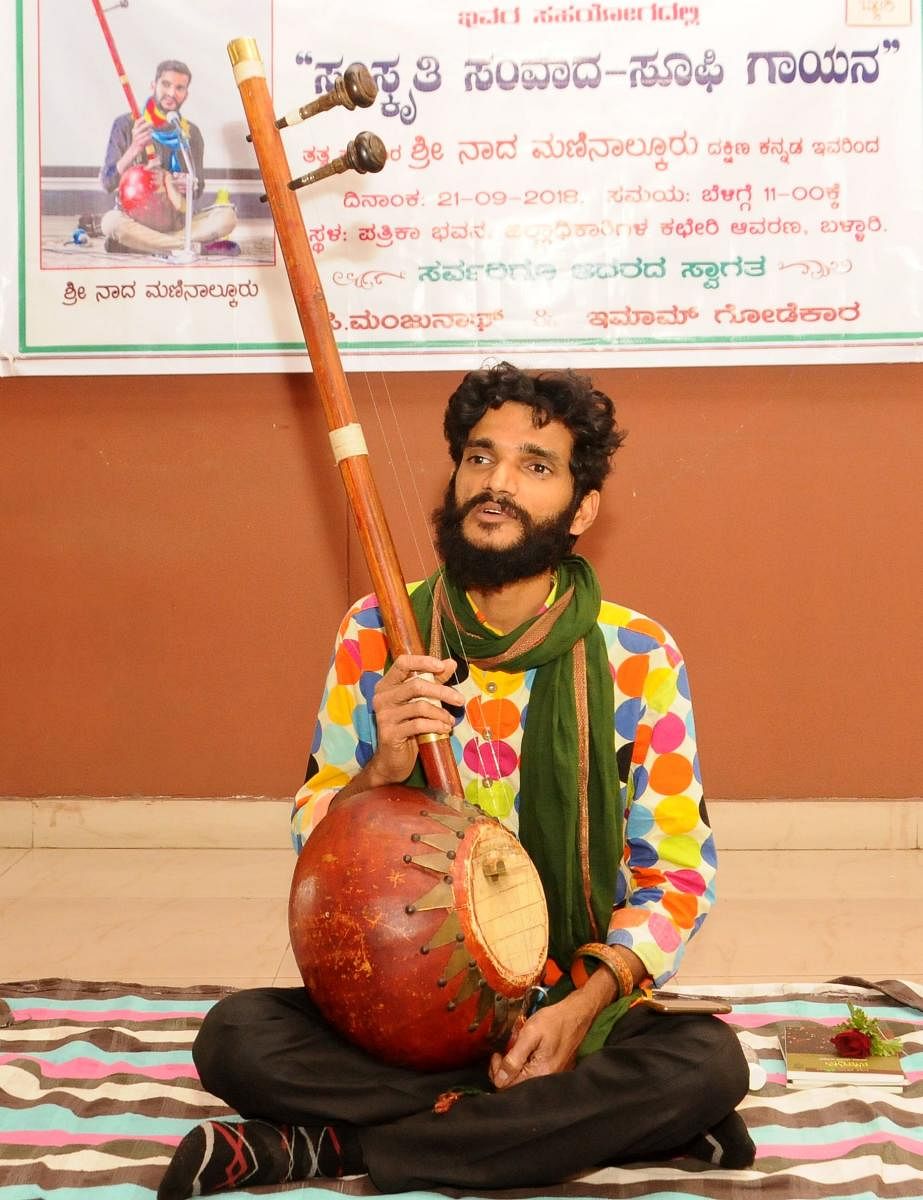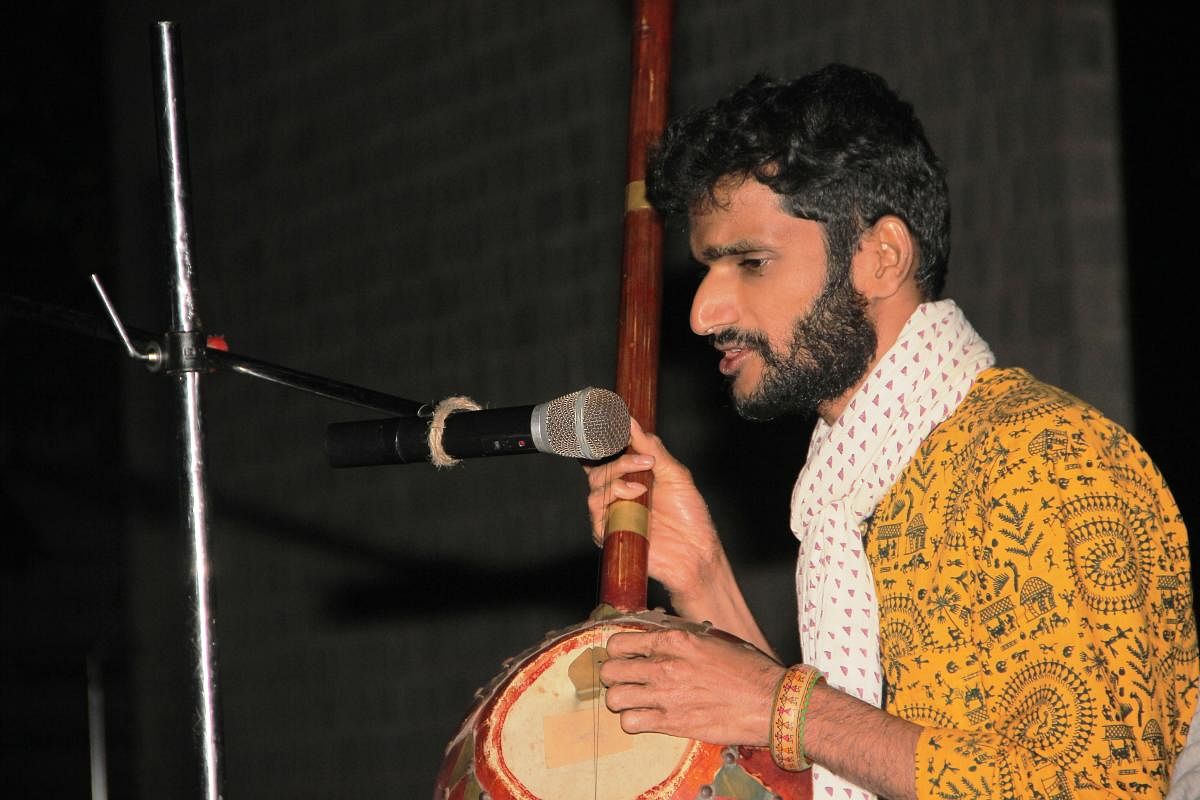
A morning walk in Bengaluru’s Cubbon Park may very well end up with you playing the chowdki or the shruti, the two folk instruments that have strong connections with Yellamma, the goddess of the oppressed. Such is the impact of these folk songs that reverberate in the vicinity, creating vibes of hope and togetherness. As I converse with Shilpa Mudbi Kothakota, the central figure among a team of enthusiasts rendering Yellammana padas to the tune of these outdoor instruments, she takes me through her travels exploring the music of the toiling masses of North Karnataka.
A trained filmmaker, Shilpa’s journey as a documentary maker gave her an opportunity to explore the rural scene, particularly the agrarian crisis and women’s issues. It didn’t take much time for her to realise that with technology, the rich tapestry of folk knowledge is set to fade away from public memory. Her exposure to theatre, along with the new-found interest in folk songs, revived Shilpa’s passion for Yellammanaata, a theatre form popular in her native in Bidar district.
“As you watch the performance, you see its main characters Renuka-Yellamma, Jamadagni and Parashurama in their crude forms. Yellamma is a deity who people relate to; she is more a human being, than a divine soul. She curses, swears and talks like you and I. At a time when religious and spiritual beliefs are realigned as per the wishes of a select few, I felt that this immersive and interactive genre, which encourages people to question and debate, instead of just be a mute spectator, holds more relevance than ever,” says Shilpa.
While rural people saw urban spaces attractive, she noticed that city dwellers did not find a real connection outside the city. This made her envision Yellammanaata (Folk rendering of Yellamma’s story) for the urban audience as an attempt to engage them in folk practices, mainly music, that celebrate life and people. “Every region in the state has a special tradition that is rooted in local history. Here common people are the protagonists. Every song has a strong connection with the activities and livelihoods of rural people and infuses energy into the working class, particularly women. Understanding these practices will help comprehend our own communities,” she says. With an aim to bring folk culture to the urban audience in its original form, and not as an exotic composition, Shilpa and her husband Aditya Kothakota, along with researcher Sumitra Sunder, started the Urban Folk Project in 2016. “If we don’t record and take it to people, we would be the last generation to have heard of people’s music. We hope to archive and showcase folk practices in a way that respects the form and its practitioners. To start with, we are documenting songs linked to Yellamma,” Aditya states.
In March 2016, Shilpa and Aditya travelled across Belagavi, Koppal, Bidar, Raichur and other districts that form the cradle of this folk art. During the travels, they met Radhabai, an expert chowdki singer, who is perhaps one of the last few chowdki artistes, and learned the basics. Likewise, Rajyotsava award winner Manjamma Jogti of Ballari district taught Shilpa the nuances of jogti dance, which is part of Yellammanaata. Both of them appreciate the efforts of Shilpa that aim to carry the tradition forward, which otherwise would have ended with them. Radha says chowdki is traditionally linked to the Devadasis and as a result, no one is ready to learn them; the jogtis have stopped the dance as they are not able to make a livelihood out of it.
There are numerous songs on Yellamma. The duo has collected 20, and Shilpa sings 12 of them at her programmes. Though the Cubbon Park experiment was necessitated as chowdki is an outdoor instrument, it has brought people from diverse backgrounds to its folds. Participants feel that it helps them appreciate their culture and language better.
Shilpa has seen people crossing the caste and religion barriers gradually to embrace Yellamma. “Though people, particularly women, like the way Yellamma is depicted in this art form, some raise questions as it is not in line with the classical portrayal. We get better insights through such debates,” she says. While they have tried to retain the original music and dance form as much as possible, they have modified it to connect to the contemporary audience. Along with Goddess Yellamma, they also portray the stories of artistes Radhabai and Manjamma.
Researcher Dr Kuruva Basavaraj appreciates the efforts of the team to make folk knowledge a part of the contemporary. “While folk culture should not remain stagnant, it should also not lose its originality on its road to popularity,” he cautions. Urban Folk Project works with educational institutes to take folk art to the youngsters. They also intend to trace the folk histories of other regions in the coming years.
On a different pitch
While Shilpa and her team are experimenting with Karnataka’s folk music, Bhaskara, popularly known as Naada Maninalkur, is trying to reach out to people across the state through Kannada songs. He is on a state-wide tour, enabling people to talk with the self and helping youngsters to overcome the challenges posed by the present and the past. A dotar and over 50 songs accompany this singer who is performing at diverse platforms, addressing students, elderly people, farmers, corporate employees, prisoners, journalists, academicians, etc. This tour is the culmination of Naada’s dream to question the norms set by the society, which as a blanket rule associates certain aspects or phenomena with good or bad, strength or weakness.
He started experiencing the contradictions within our society when he entered the field of Yakshagana two decades ago. While most of the plays portrayed women as weak or in a negative shade, Naada had seen a strong, responsible and caring person in his mother, who single-handedly managed the house. Also, the caste equations that worked subtly at different levels started troubling him. Though he, along with his friend, protested all such actions, he moved out after nine years to work in the social sector. His later exposures to journalism, theatre and tailoring moulded him into a sensible person who responded to the society positively.
His inner urge to make people question the irrational beliefs got a boost when he underwent training as a youth worker at Baduku College, run by Samvada organisation in Bengaluru. During the course, he also realised the power of music to reach the souls. “Having worked in different fields, I had come across various problems that rock households and the society. From the feeling of isolation to social media addiction, we are all lost in our own world. Still, we don’t have time to contemplate,” Naada says.
He used music as a medium to interact with people, and help them connect with each other. His first effort, ‘Kattala Haadu’, a series of musical events in the night, without electric lighting, was an attempt to defy the popular notion that darkness is negative. People who attended felt that the songs rendered without any instruments except dotar were empathetic, therapeutic and enjoyable.
Rafi, a taluk panchayat member in Gangavati who organised an event recently, recalls the overwhelming response that pushed them to schedule multiple programmes. “Humanity scores above all in the songs. While the focus is to connect the souls and sensitise people towards current issues, his rendering of the songs by explaining the context of each song takes us to a different world crossing the barriers of caste, language, religion and region.”
Going a step further, through this organisation Arivu, Naada works with youngsters in various parts of the state. In the last six years, he has been working with numerous colleges at various levels — awareness, sensitisation, leadership — and songs have emerged as a powerful medium of disseminating information and messages.
Though he started with revolutionary songs, now he incorporates other compositions that are relevant. In the present tour, called ‘Karnataka Yatre’, he has chosen around 60 songs and renders five to six songs in one event.
The focus is to start a conversation and the audiences are encouraged to interact after every song. The concept of awareness through performance has given a new dimension to the music culture that is evolving in the state. Naada started the tour in May and has covered 21 districts so far.
He sings compositions of Kuvempu, Kabir, G S Shivarudrappa, Kanakadasa, Mudnakudu Chinnaswamy, Janardhan, Krishnamurthy Biligere, Srinivas Karkala et al. Some of his popular renderings are ‘Namma elubina handaradolagondu mandiravide’ , ‘Gelluvudu geluve alla’, and ‘Kalisu guruve kalisu’.
Shwetha, a counsellor, feels that one such song is equivalent to several speeches given over a day. “The pitch is not evocative, but the content awakens you. As you relax to the low pitch and slow beats, you start thinking of the challenges we face in everyday life, from gender bias to the race to succeed, and the search for happiness. Such efforts are the need of the hour.”
It is their passion to connect people through music that has made them popular, and the common thread is the songs of the soil.
